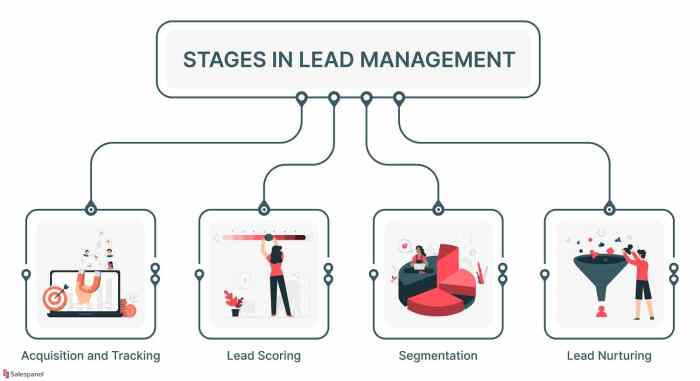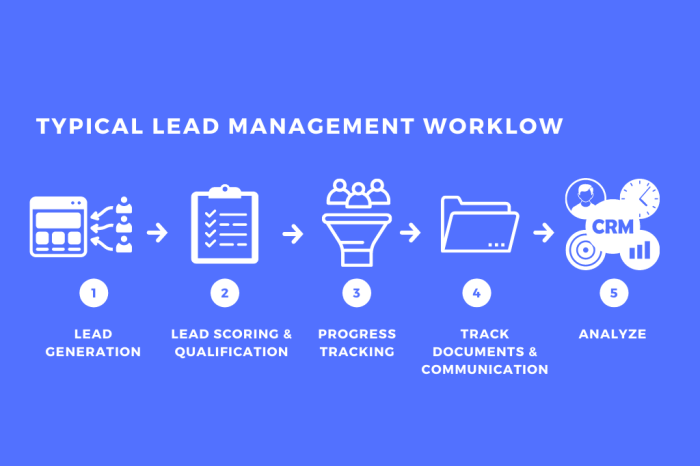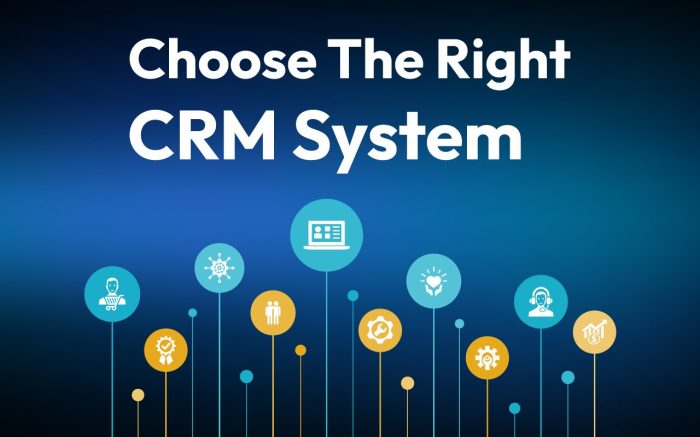CRM for Lead Generation and Management A Powerful Tool for Growth
CRM for Lead Generation and Management is a game-changer for businesses seeking to effectively attract, nurture, and convert leads into loyal customers. It’s not just about managing contacts; it’s about strategically orchestrating every touchpoint in the customer journey, from the initial inquiry to the final sale.
By leveraging a robust CRM system, businesses can streamline their lead generation efforts, automate repetitive tasks, and gain valuable insights into customer behavior. This data-driven approach allows for personalized communication, targeted marketing campaigns, and a deeper understanding of customer needs, ultimately leading to increased sales and customer satisfaction.
The Power of CRM for Lead Generation and Management

In today’s competitive business landscape, capturing and nurturing leads is paramount to achieving sustainable growth. A robust Customer Relationship Management (CRM) system acts as the backbone for streamlining this process, empowering businesses to effectively manage their customer interactions, optimize lead generation efforts, and ultimately drive sales success.
The Role of CRM in Capturing and Nurturing Leads
A CRM system serves as a central hub for storing and organizing all your customer and prospect information. This includes contact details, communication history, interactions, preferences, and even purchase history. By consolidating this data in one place, you gain a comprehensive understanding of each lead, allowing you to personalize your interactions and tailor your messaging for maximum impact.
Facilitating Lead Generation Through Various Channels
CRM tools are designed to seamlessly integrate with various lead generation channels, ensuring a consistent and efficient flow of prospects into your system.
- Website Forms: CRM systems can be integrated with your website to capture leads through contact forms, registration forms, and other online interactions. This allows you to collect valuable information about potential customers directly from your website.
- Social Media: With social media integration, you can track leads who interact with your brand on platforms like Facebook, Twitter, and LinkedIn. You can even use social media advertising to generate leads directly from your CRM system.
- Email Marketing: CRM systems enable you to create targeted email campaigns based on lead segmentation and behavior. This allows you to nurture leads, educate them about your products or services, and drive them towards conversion.
Managing Leads Effectively Within a CRM Platform
Effective lead management within a CRM platform involves a combination of strategies to optimize lead qualification, nurturing, and conversion.
- Lead Segmentation: By segmenting your leads based on demographics, interests, and behavior, you can tailor your communication and marketing efforts to resonate with each group. This helps you focus your resources on the most promising leads.
- Lead Scoring: Lead scoring assigns points to leads based on specific criteria, such as website activity, email engagement, and form submissions. This allows you to prioritize leads based on their potential value and allocate your sales team’s time accordingly.
- Automation: CRM systems offer automation features that streamline repetitive tasks, such as sending welcome emails, scheduling follow-ups, and updating lead status. This frees up your team to focus on more strategic activities.
Key Features of CRM for Lead Generation and Management
A CRM system is more than just a contact list; it’s a powerful tool that can streamline your lead generation and management processes, driving conversions and boosting sales. Understanding the essential features of a CRM system is crucial for maximizing its potential.
Contact Management
Effective contact management is the foundation of any successful CRM system. This feature allows you to store and organize all your potential customer information in a centralized location, providing a comprehensive view of each lead’s journey.
- Detailed Profiles: Create rich contact profiles that include contact information, demographics, communication preferences, and interaction history. This allows you to tailor your outreach and messaging to individual needs.
- Segmentation: Group contacts into segments based on shared characteristics, allowing you to send targeted marketing campaigns and personalized communications. For example, you can segment your audience by industry, job title, or purchase history.
- Activity Tracking: Record all interactions with leads, including emails, phone calls, meetings, and website visits. This provides valuable insights into lead engagement and helps identify opportunities for improvement.
Lead Scoring
Lead scoring is a crucial feature that assigns a numerical value to each lead based on their potential to convert into a paying customer. This helps prioritize leads and allocate resources effectively.
- Qualifying Leads: By scoring leads based on specific criteria like website activity, engagement with marketing materials, or demographics, you can identify high-potential leads that are more likely to convert.
- Prioritizing Efforts: Focus your sales efforts on the highest-scoring leads, increasing your chances of closing deals and maximizing return on investment (ROI).
- Predictive Analytics: Some CRM systems utilize predictive analytics to score leads based on historical data and patterns, providing a more accurate assessment of their conversion potential.
Marketing Automation
Marketing automation simplifies and streamlines repetitive tasks, freeing up your time to focus on more strategic initiatives.
- Automated Email Campaigns: Send targeted email sequences based on lead behavior, nurturing them through the sales funnel and keeping them engaged. This can include welcome emails, follow-up messages, and abandoned cart reminders.
- Workflow Automation: Create automated workflows to manage lead interactions and tasks, ensuring consistent follow-up and personalized communication. This can include assigning leads to specific sales representatives, sending automated reminders, and scheduling meetings.
- Social Media Integration: Connect your CRM to social media platforms to track social media mentions, engage with potential customers, and gather insights into their online behavior.
Reporting and Analytics
CRM systems provide powerful reporting and analytics tools that offer valuable insights into your lead generation and management efforts.
- Lead Source Tracking: Identify the most effective channels for generating leads, allowing you to optimize your marketing spend and focus on high-performing strategies.
- Conversion Rate Analysis: Track your conversion rates at different stages of the sales funnel, identifying bottlenecks and areas for improvement.
- Sales Performance Monitoring: Analyze sales team performance, identify top performers, and provide insights for training and development.
CRM Integration for Enhanced Lead Generation

Integrating your CRM with other marketing and sales tools can significantly enhance your lead generation efforts, streamlining processes, automating workflows, and providing valuable insights. By connecting different systems, you create a unified platform for managing all your customer interactions, from initial contact to conversion.
Benefits of CRM Integration
- Centralized Data Management: By integrating your CRM with other tools, you can consolidate all your customer data in one place, providing a complete picture of each lead’s journey. This centralized view allows you to track interactions, understand customer behavior, and personalize your communications more effectively.
- Automated Workflows: Integration allows you to automate repetitive tasks, such as lead scoring, nurturing campaigns, and follow-up emails. This frees up your team to focus on more strategic initiatives, like building relationships and closing deals.
- Improved Lead Qualification: Integrating your CRM with analytics dashboards provides insights into lead quality and behavior. This data can help you prioritize leads based on their likelihood to convert, leading to a more efficient sales process.
- Enhanced Reporting and Analytics: By integrating your CRM with reporting and analytics tools, you gain access to comprehensive data about your lead generation efforts. This allows you to track key metrics, identify areas for improvement, and optimize your strategies for better results.
Examples of CRM Integration
- Email Marketing Platforms: Integrating your CRM with email marketing platforms like Mailchimp or Constant Contact allows you to personalize email campaigns based on customer data. This can include segmenting your audience, sending targeted offers, and tracking email performance to optimize your campaigns.
- Social Media Management Tools: Connecting your CRM with social media management tools like Hootsuite or Buffer enables you to track social media interactions and identify potential leads. You can then automatically add these leads to your CRM system for further nurturing and follow-up.
- Analytics Dashboards: Integrating your CRM with analytics dashboards like Google Analytics provides insights into website traffic, user behavior, and conversion rates. This data can be used to optimize your website for lead generation and identify the most effective channels for reaching your target audience.
CRM Integrations and Their Functionalities
| Integration | Benefits | Examples |
|---|---|---|
| Email Marketing Platforms | Personalized email campaigns, automated email sequences, lead nurturing, and email performance tracking. | Mailchimp, Constant Contact, HubSpot, Salesforce Marketing Cloud |
| Social Media Management Tools | Social media lead capture, automated social media posting, social media analytics, and social media advertising integration. | Hootsuite, Buffer, Sprout Social, Sprinklr |
| Analytics Dashboards | Website traffic analysis, user behavior tracking, conversion rate optimization, and marketing attribution. | Google Analytics, Adobe Analytics, Mixpanel, Kissmetrics |
| Sales Automation Tools | Lead scoring, lead qualification, sales forecasting, and sales pipeline management. | Salesforce, HubSpot Sales, Zoho CRM, Microsoft Dynamics 365 |
| Customer Support Tools | Customer service ticketing, live chat, knowledge base integration, and customer feedback collection. | Zendesk, Intercom, Freshdesk, Help Scout |
CRM for Lead Nurturing and Conversion

Lead nurturing is a crucial aspect of the sales process that involves building relationships with potential customers and guiding them through the sales funnel. CRM systems play a vital role in this process by providing the tools and infrastructure needed to effectively nurture leads and convert them into paying customers.
Personalized Communication and Targeted Content
CRM systems enable businesses to personalize communication with leads based on their individual interests, preferences, and behaviors. By leveraging data collected from various sources, such as website activity, email interactions, and social media engagement, CRM systems can create targeted content and messages that resonate with each lead. For instance, a CRM system can identify a lead who has downloaded a specific whitepaper on a particular topic and send them a follow-up email with related resources, such as case studies or webinars.
This personalized approach helps build trust and credibility, making leads more receptive to the brand’s offerings.
Strategies for Utilizing CRM Features
- Email Automation: CRM systems can automate email campaigns based on specific triggers, such as website visits, form submissions, or specific actions taken by the lead. Automated email sequences can provide valuable information, answer common questions, and guide leads through the sales funnel at their own pace. For example, a welcome email series can be triggered when a lead signs up for a newsletter, introducing them to the brand and its offerings.
- Lead Scoring: Lead scoring is a process of assigning points to leads based on their engagement and behavior. CRM systems can automate lead scoring by tracking various metrics, such as website visits, email opens, and form submissions. By analyzing these data points, businesses can prioritize leads with higher scores, indicating a greater likelihood of conversion. This allows sales teams to focus their efforts on leads with the highest potential.
- Workflow Automation: CRM systems can automate workflows based on predefined rules and triggers. For example, a workflow can be set up to automatically send a follow-up email to a lead who has not responded to a previous communication within a specified timeframe. Workflow automation helps streamline the lead nurturing process, ensuring that leads are consistently engaged and receive timely communication.
Examples of Successful Lead Nurturing Campaigns
- Marketo: A B2B marketing automation platform, Marketo, successfully implemented a lead nurturing campaign for a software company. They created a series of automated emails that provided valuable content and resources to leads based on their interests and stage in the sales funnel. The campaign resulted in a significant increase in lead engagement and conversion rates. Key elements contributing to its success included personalized content, relevant email triggers, and data-driven insights to optimize the campaign over time.
- HubSpot: HubSpot, a leading CRM platform, used lead nurturing campaigns to help a technology company generate qualified leads and increase sales. Their strategy involved creating targeted content, such as blog posts, ebooks, and webinars, that addressed specific pain points and challenges faced by their target audience. They also used email automation to deliver these resources to leads based on their interests and stage in the buyer’s journey.
This resulted in a substantial increase in lead conversion rates and improved sales pipeline.
Measuring and Analyzing CRM Performance
Understanding how well your CRM system is performing is crucial for optimizing your lead generation and management processes. By tracking key metrics and analyzing data, you can identify areas for improvement and maximize your return on investment.
Key Metrics for Tracking CRM Effectiveness
To assess the effectiveness of your CRM, you need to track relevant metrics that provide insights into different aspects of your lead generation and management activities. These metrics can be categorized into:
- Lead Generation Metrics: These metrics measure the success of your efforts in attracting and capturing new leads.
- Lead Nurturing Metrics: These metrics evaluate how effectively you are engaging and qualifying leads through your nurturing campaigns.
- Lead Conversion Metrics: These metrics track the efficiency of your sales team in converting qualified leads into paying customers.
Analyzing CRM Data for Improvement
Once you have gathered data on key metrics, the next step is to analyze it to identify areas for improvement. This involves:
- Identifying Trends: Look for patterns and trends in your data to understand how different factors impact your lead generation and management processes.
- Benchmarking: Compare your performance to industry benchmarks and best practices to identify areas where you can improve.
- A/B Testing: Experiment with different approaches to your lead generation and management strategies to determine which ones are most effective.
Common CRM Performance Metrics
Here’s a table outlining common CRM performance metrics, their definitions, and how they can be used to assess lead generation and management effectiveness:
| Metric | Definition | Assessment |
|---|---|---|
| Lead Acquisition Cost (LAC) | The average cost incurred to acquire a new lead. | Track trends in LAC over time and compare it to industry benchmarks. Aim to reduce LAC by optimizing lead generation channels and strategies. |
| Lead Conversion Rate | The percentage of leads that convert into paying customers. | Analyze conversion rates across different lead sources, campaigns, and sales representatives to identify areas for improvement. |
| Customer Lifetime Value (CLTV) | The total revenue generated from a customer over their lifetime. | High CLTV indicates successful customer relationships and retention strategies. |
| Customer Acquisition Cost (CAC) | The total cost incurred to acquire a new customer. | Track CAC and compare it to CLTV to assess the profitability of customer acquisition efforts. |
| Average Deal Size | The average revenue generated per closed deal. | Analyze average deal size across different products or services to identify opportunities for upselling or cross-selling. |
| Sales Cycle Length | The average time it takes to close a deal from the initial lead to a sale. | Analyze sales cycle length to identify bottlenecks and streamline the sales process. |
| Lead Response Time | The average time it takes to respond to a new lead. | Prompt lead response is crucial for capturing interest and building trust. Aim for quick response times. |
| Email Open Rate | The percentage of emails that are opened by recipients. | Analyze email open rates to optimize email subject lines, content, and timing. |
| Click-Through Rate (CTR) | The percentage of recipients who click on a link in an email. | Analyze CTR to improve the effectiveness of email calls to action and landing pages. |
CRM Best Practices for Lead Generation and Management
A well-structured CRM system can significantly enhance your lead generation and management efforts, leading to higher conversion rates and improved customer relationships. By implementing best practices, you can optimize your CRM for maximum effectiveness.
Effective CRM Setup and Configuration
Setting up and configuring your CRM system effectively is crucial for its success.
- Define clear goals and objectives: Before implementing a CRM, define your specific goals for lead generation and management. This could include increasing lead volume, improving lead quality, or streamlining the sales process. Having clear objectives will help you choose the right features and customize the system accordingly.
- Customize fields and workflows: Tailor your CRM to your specific business needs by customizing fields and workflows. This allows you to capture relevant data, track progress, and automate tasks for greater efficiency.
- Integrate with other tools: Connect your CRM with other essential business tools like marketing automation platforms, email marketing services, and social media platforms. This integration enables seamless data flow and improves overall efficiency.
- Train your team: Provide comprehensive training to your team on how to effectively use the CRM system. This ensures everyone understands its functionalities and can utilize it to its full potential.
Data Management and Lead Qualification
Maintaining accurate and up-to-date data is crucial for effective lead generation and management.
- Data cleansing and enrichment: Regularly cleanse and enrich your CRM data to ensure its accuracy and completeness. This involves removing duplicates, updating contact information, and adding relevant details like job titles and company information.
- Lead scoring and qualification: Implement a lead scoring system to prioritize leads based on their potential value. This helps you focus your efforts on the most qualified leads, increasing conversion rates.
- Segmentation and targeting: Segment your leads based on demographics, interests, and behavior to create targeted marketing campaigns. This allows you to deliver personalized messages and improve engagement.
Lead Nurturing and Communication, CRM for Lead Generation and Management
Effective communication and nurturing are essential for converting leads into customers.
- Personalized communication: Utilize your CRM to personalize communication with leads based on their individual needs and preferences. This includes sending targeted emails, providing relevant content, and offering personalized offers.
- Automated email sequences: Set up automated email sequences to nurture leads through different stages of the sales funnel. This helps keep leads engaged and informed while you focus on other tasks.
- Multi-channel communication: Engage leads through multiple channels, such as email, social media, and phone calls. This provides a more comprehensive and personalized experience, increasing the likelihood of conversion.
Measuring and Analyzing CRM Performance
Regularly track and analyze your CRM performance to identify areas for improvement.
- Key performance indicators (KPIs): Establish relevant KPIs to measure the effectiveness of your CRM strategy. These could include lead conversion rate, customer acquisition cost, and average deal size.
- Reporting and dashboards: Utilize CRM reporting and dashboard features to visualize data and gain insights into your performance. This helps you identify trends, track progress, and make informed decisions.
- A/B testing: Conduct A/B testing on different elements of your CRM strategy, such as email subject lines, landing pages, and lead nurturing campaigns. This allows you to optimize your approach and maximize results.
Key Takeaways and Actionable Steps
- Start with a clear goal: Define your specific goals for lead generation and management before implementing a CRM system. This will guide your choices and ensure you get the most out of your CRM.
- Customize and integrate: Tailor your CRM to your business needs by customizing fields and workflows and integrating it with other essential tools.
- Prioritize data quality: Regularly cleanse and enrich your CRM data to ensure its accuracy and completeness. This is crucial for effective lead scoring, qualification, and targeting.
- Nurture leads effectively: Implement personalized communication strategies, automated email sequences, and multi-channel engagement to nurture leads and guide them through the sales funnel.
- Track and analyze performance: Regularly monitor your CRM performance using relevant KPIs, reporting features, and A/B testing to identify areas for improvement and optimize your strategy.
In today’s competitive landscape, businesses need every advantage they can get. Implementing a CRM system for lead generation and management can be the key to unlocking significant growth potential. By harnessing the power of automation, data analytics, and personalized communication, businesses can cultivate stronger customer relationships, drive sales, and ultimately achieve their business goals.
FAQ Section
What are the main benefits of using CRM for lead generation and management?
CRM offers numerous benefits, including improved lead capture and qualification, automated follow-ups, personalized communication, enhanced customer segmentation, and valuable insights into customer behavior.
How can I choose the right CRM system for my business?
Consider factors like your budget, business size, industry, and specific needs. Research different CRM platforms, compare features, and explore free trials to find the best fit for your organization.
What are some common CRM integrations for lead generation?
Popular integrations include email marketing platforms, social media management tools, analytics dashboards, and website forms. These integrations streamline workflows, provide valuable data, and enhance overall lead generation efficiency.
